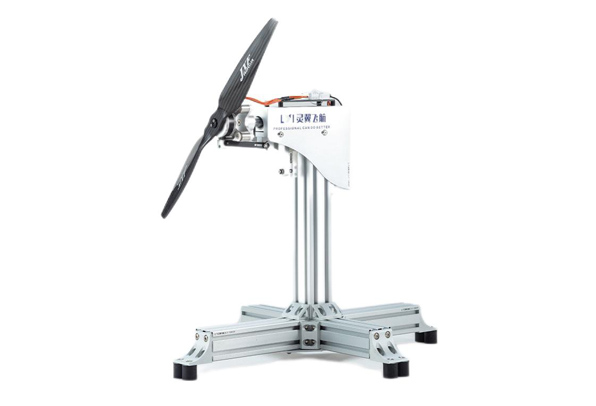In the rapidly advancing world of drone technology, ensuring the optimal performance of your drone is paramount. A drone test thrust stand is an indispensable tool for evaluating and enhancing the thrust capabilities of your drone's motors. This article provides an in-depth exploration of drone test thrust stands, detailing their importance, functionality, and how to effectively utilize them for superior drone performance.
A drone test thrust stand is a specialized device designed to measure the thrust output of drone motors. This measurement is crucial for assessing the efficiency and power of the motors, which directly impacts the drone's flight performance. By providing precise thrust data, a thrust stand enables drone enthusiasts, hobbyists, and professionals to make informed decisions about motor selection, propeller choice, and overall drone design.

Understanding the thrust capabilities of your drone's motors is essential for several reasons:
Optimizing Motor Performance: Accurate thrust data helps in selecting the most efficient motors, ensuring that your drone can achieve its desired performance levels.
Balancing Weight and Power: By knowing the exact thrust output, you can better balance the drone's weight and power, leading to improved flight stability and maneuverability.
Enhancing Flight Time: Efficient motors with optimal thrust output contribute to longer flight times, which is critical for both recreational and professional drone use.
Customizing Propellers: Different propellers can significantly impact thrust. A thrust stand allows you to test various propellers to find the best combination for your specific needs.
There are several types of drone test equipment available, each catering to different testing needs and preferences:
Fixed thrust stands are stationary devices where the motor and propeller setup remains fixed in one position. These stands are ideal for consistent and repeatable thrust measurements. They provide a stable platform for testing various motor and propeller configurations.
Dynamic thrust stands allow for more complex testing scenarios, including varying the angle and orientation of the motor and propeller setup. This type of stand is useful for simulating real-world flight conditions and understanding how different angles affect thrust output.
Equipped with digital readouts, these thrust stands offer precise and easy-to-read thrust measurements. Digital thrust stands often include additional features such as data logging and integration with software for detailed analysis.
When choosing a drone test thrust stand, consider the following features to ensure you get the most accurate and useful data:
Precision Sensors: High-quality sensors are crucial for accurate thrust measurements.
Sturdy Construction: A durable and stable build ensures consistent and reliable results.
Data Logging Capabilities: The ability to record and analyze thrust data over time can provide deeper insights into motor performance.
Compatibility: Ensure the thrust stand is compatible with the range of motors and propellers you plan to test.
Proper setup is essential for obtaining accurate thrust measurements. Follow these steps to ensure your thrust stand is ready for testing:
Secure the Thrust Stand: Ensure the stand is placed on a stable, level surface to prevent any movement during testing.
Mount the Motor and Propeller: Carefully mount the drone motor and propeller setup on the stand according to the manufacturer's instructions.
Calibrate the Sensors: If your thrust stand includes calibration options, follow the instructions to calibrate the sensors for accurate readings.
Connect Power and Data Cables: Connect the necessary power supply and data cables to your thrust stand and any connected devices such as computers or data loggers.
To conduct effective thrust tests, follow these best practices:
Start with Low Throttle: Begin testing at low throttle settings to ensure everything is functioning correctly.
Gradually Increase Throttle: Slowly increase the throttle while monitoring the thrust output and ensuring the setup remains stable.
Record Data: Use data logging features to record thrust measurements at various throttle levels.
Repeat Tests: Conduct multiple tests with different motor and propeller configurations to gather comprehensive data.
The data collected from your thrust tests can provide valuable insights into your drone's performance. Key metrics to analyze include:
Maximum Thrust: The highest thrust output achieved during testing, indicating the peak performance of the motor-propeller combination.
Thrust-to-Weight Ratio: Calculated by dividing the maximum thrust by the weight of the drone. A higher ratio indicates better performance and maneuverability.
Efficiency: Assessing the thrust output relative to power consumption can help in selecting the most efficient motors and propellers.
By leveraging the data from your thrust tests, you can make informed decisions to enhance your drone's performance:
Selecting the Right Motors: Choose motors that provide the best balance of thrust and efficiency for your specific application.
Optimizing Propellers: Identify the propeller designs that maximize thrust and efficiency for your motor setup.
Balancing Components: Ensure that all components of your drone are balanced and optimized based on the thrust data, leading to better overall performance.
A drone test thrust stand is an essential tool for anyone serious about optimizing their drone's performance. By providing accurate and detailed thrust measurements, it enables you to make informed decisions about motor and propeller choices, ultimately leading to better flight stability, longer flight times, and enhanced overall performance. Whether you're a hobbyist or a professional, investing in a high-quality thrust stand and understanding how to use it effectively will pay dividends in the performance and reliability of your drones.
Comments
Please Join Us to post.
0